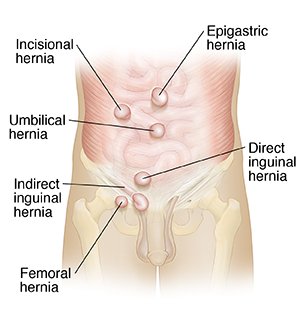Hernia

A hernia is when an organ or tissue pushes through a weak area in the belly (abdominal) wall. This weak area may be there at birth. Or it may be caused by abdominal strain over time. If not treated, a hernia can get worse with time and physical stress.
When a bulge forms
When there is a weak area in the abdominal wall, an organ or tissue can push outward. This often causes a bulge that you can see under your skin. The bulge may get bigger when you stand up. It may go away when you lie down. You may also feel some pressure or mild pain when lifting, coughing, urinating, or doing other activities.
Types of hernias
The type of hernia you have depends on where it’s at. Most hernias form in the groin at or near the internal ring. This is the entrance to a canal between the abdomen and groin. Hernias can also occur in the abdomen, thigh, or genitals.
- An incisional hernia occurs at the site of a previous surgical cut (incision).
- An umbilical hernia occurs at the bellybutton (navel).
- An indirect inguinal hernia occurs in the groin at the internal ring.
- A direct inguinal hernia occurs in the groin near the internal ring.
- A femoral hernia occurs just below the groin.
- An epigastric hernia occurs in the upper abdomen at the midline.
- Other types of hernias can occur. But they are rare.
Diagnosis
In most cases, your healthcare provider can diagnose a hernia by doing a physical exam.
In some cases, it might not be clear why you have swelling in the belly wall. Then your provider may order an imaging test such as an ultrasound. This can help with the diagnosis.
Surgery
A hernia will not heal on its own. Surgery is needed to fix the weak spot in the belly wall. If not treated, a hernia can get larger. It can also cause serious health problems. Some hernias can be watched. They can then be fixed if they grow bigger or start to cause symptoms. The good news is that hernia surgery can be done quickly and safely.
Most hernias are fixed with laparoscopic surgery. This type of surgery is done through several very small cuts. Other hernias may need open surgery. A larger cut is made in the belly. In some cases, you can go home the same day as your surgery.
When to call your provider
Call or see your healthcare provider right away if the swelling around your hernia becomes larger, firmer, or more painful. These may be signs that your intestines are stuck in the belly wall. This is an emergency. The hernia must be fixed right away to prevent serious problems.
For more information or to schedule an appointment, call:
| SBL Evergreen Clinic 1104 West Evergreen Ave. Effingham, IL 62401 217 347-2500 |
SBL Surgery Clinic 1000 Health Center Dr., Suite 101 Mattoon, IL 61938 217 258-4020 |
